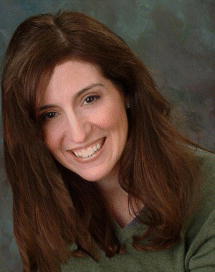 I am pleased to welcome Wendy Mass to my blog. I’ve been a fan of her work, particularly of Jeremy Fink and the Meaning of Life. If you haven’t read it yet, you really need to. It is perhaps one of my favorite MG books that I’ve read this year. My husband did and couldn’t wait to discuss it. And that is saying something.
I am pleased to welcome Wendy Mass to my blog. I’ve been a fan of her work, particularly of Jeremy Fink and the Meaning of Life. If you haven’t read it yet, you really need to. It is perhaps one of my favorite MG books that I’ve read this year. My husband did and couldn’t wait to discuss it. And that is saying something.
HWM: You’ve had what some people would consider a “glamorous” career in the entertainment industry. What made you want to write books for teens? How did you get your “break” into getting published?
Wendy Mass: LOL at glamorous. Although there was that one time I was an extra in Nightmare on Elm Street Part 5. That was pretty glam. I got to wear a sweaty Freddy Krugar mask, stick my head out of a plastic tree, and moan. Now every time I’m hiking I’m sure a face is going to pop out of a tree. I did have some fun Hollywood jobs though—working for a casting agent, literary agents, film producers, and getting story credit for an episode of the TV show Monk. I was told by one big mover and shaker that I was “too nice” for the entertainment biz. I think the bottom line is that to make it out there, you have to really, really want it more than anything in the world. And what I really wanted more than anything was to write books for kids and teenagers. It’s my small way of paying homage to the books that were so important to me when I was growing up.
 As for breaking into publishing, it took a decade of trying. I pitched and sold my first short story with a huge piece of spinach in my teeth, so I’m convinced the editor just said yes so she wouldn’t have to keep staring at it. At least when Little Brown & Company bought my first book—A Mango-Shaped Space—I didn’t have to worry about their motives!
As for breaking into publishing, it took a decade of trying. I pitched and sold my first short story with a huge piece of spinach in my teeth, so I’m convinced the editor just said yes so she wouldn’t have to keep staring at it. At least when Little Brown & Company bought my first book—A Mango-Shaped Space—I didn’t have to worry about their motives!
HWM: I never realized until I did some research, that you’ve written a number of non-fiction books for children/teens. What do you consider makes a successful non-fiction book? Do you miss writing non-fiction?
Wendy Mass: I loved writing the nonfiction books, and for a while I would alternate fiction and non. Basically I chose topics that I was eager to learn more about, since I knew I’d be researching the topic for months. Writing about Stonehenge got me a pass inside the inner circle of rocks, and writing a book about Halloween got me, well, lots of candy! Writing a biography of children’s book authors led to my first meeting with Judy Blume. Some kids want to meet rock stars or movie stars, but to an aspiring children’s book writer, she’s the person you want to meet. It took years until I got up the nerve to approach her, and of course she’s wonderful and lovely and encouraging.
I think what makes a good nonfiction book is one that doesn’t feel dry–where the author’s passion for the topic shows through and excites the reader, too. I’ve stopped writing the nonfiction books for now, but have kept up the practice of writing about topics that I’m curious to learn more about. With A Mango-Shaped Space it was synesthesia, and with Every Soul a Star it’s astronomy.
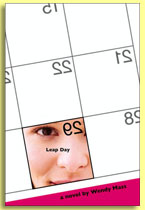 HWM:Your fiction books are wonderful. If you had to choose, which ones are your favorites and why?
HWM:Your fiction books are wonderful. If you had to choose, which ones are your favorites and why?
Wendy Mass: Writing each book was such a different experience, depending on what was going on in m
y life at the time, or how crazy the deadline was, or how freaked out I got halfway through because the characters were taking the book somewhere I didn’t expect. A Mango-Shaped Space is the closest to my heart because it was my first. Leap Day was the most fun to write and spilled out onto the page very quickly. I learned the most while writing Jeremy Fink and the Meaning of Life, and it was also the hardest because the topic was so, well, meaning of life-ish. With Heaven Looks a Lot Like the Mall, I wrote it while so sleep deprived after the twins were born that I look at it now and don’t even remember writing huge parts of it. It’s kinda fun to pick up your own book and get to experience it almost the same way a reader would.
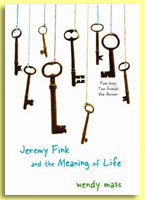 HWM: I loved Jeremy Fink and the Meaning of Life. Did you have difficulty writing from a boy’s POV? What did you do to keep Jeremy’s voice authentic?
HWM: I loved Jeremy Fink and the Meaning of Life. Did you have difficulty writing from a boy’s POV? What did you do to keep Jeremy’s voice authentic?
Wendy Mass: I started Jeremy Fink soon after finishing Leap Day, where I had experimented with a lot of different character’s points of view. I found that I really enjoyed writing from the male POV, and that’s why I chose to do it for Jeremy. I also liked the idea of writing something that might attract boys as well as girls. I was lucky enough to have a chatty 12-year-old boy as a neighbor. He used to take these long walks through the neighborhood, alone, just thinking about life. I gave him the first few chapters and asked him if it felt like a real boy’s voice. His only response was, “What’s in the box?” so I figured I didn’t need to worry. :o)
HWM: You have a wonderful ability to bring your characters to life through emotion and humor. Which is easier for you to write–the humor or the emotion?
Wendy Mass: I think if I’ve done my job by plotting the book well enough, then that stuff will just grow naturally out of what the character needs to feel at that moment. If I have to concentrate on being funny then it doesn’t work. And for the more emotional scenes, if it doesn’t make me cry while I’m writing it, I start over!
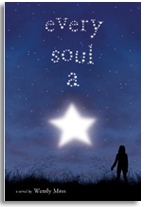 HWM: Every Soul a Star was just released this month. What did you do to celebrate?
HWM: Every Soul a Star was just released this month. What did you do to celebrate?
Wendy Mass: Yikes! I forgot to celebrate! Is it too late?
HWM: Every Soul a Star is written from three points of view. This must have been a challenge! How did you decide on these three characters? Did you know right away you were going to write the book from 3 POV’s?
Wendy Mass: When I first proposed the book to my editor, the whole story was in only one voice—the character who became Jack. But when I sat down to write it, I just kept thinking that there were so many different ways to tell this story. So I basically started at the end—with the solar eclipse—and thought about what would bring different people to be standing in this remote spot at this unique point in history? Then I came up with three characters—the one who lived there, the one who didn’t want to be there, and the one who found himself there at the last minute. It was definitely a challenge, but I kept a big chart that showed what each character was doing in each chapter, making sure their stories kept pace with each other, and that their storylines could each stand on its own.
HWM: Who was the hardest POV to write? Easiest POV?
Wendy Mass: Honestly I enjoyed writing all of them equally. I would look forward to returning to each one in turn, like a friend I hadn’t seen in 20 pages. They were all so different, so none really felt harder than another.
HWM: One of the minor characters in the book has food allergies. What inspired this?
Wendy Mass: I knew I wanted a scene where one of the main characters—Jack—would at first mess up, but would wind up coming through in the end. I thought for a while that the character who Jack has to help would have an allergic reaction to a bee, but wound up doing the food since it’s so prevalent these days and having the right medicine at arms’ reach is so important.
 HWM: Your books are empowering for teens. How long do you research different topics to create your characters and their areas of expertise?
HWM: Your books are empowering for teens. How long do you research different topics to create your characters and their areas of expertise?
Wendy Mass: I love researching things, so I spend a ton of time doing that before the actual writing. Probably too much time! Once I’ve exhausted written material, I go out in the world to experience the topic as much as I can. With A Mango-Shaped Space I traveled the country attending meetings and lectures about synesthesia, and for Every Soul a Star I visited planetariums, took a class in stargazing, bought a telescope I can’t figure out how to use, and saw Saturn at a nearby observatory. Even after all that, I still give sections of each book to experts in the different fields before I hand it in.
HWM: I love the plotting in your books. On your website, you kindly share an essay on your outlining strategies. Have you ever veered from this method and just written on the fly?
Wendy Mass: For some reason when I was writing Jeremy Fink I used it only loosely, to do the main outline. As a result, I definitely had a harder time writing the book. I
think for some people having the book mapped out ahead of time sounds like it takes the creativityout of it, but for me it’s the opposite. Not worrying about the plotting frees me up to focus on the writing itself.
HWM: I understand from your blog that you’re writing a new book called The Candymaker’s Son. Are you able to tell us anything about it? Are you enjoying the research of candy?
Wendy Mass: I’m a huge candy person. My editor, Alvina Ling, is too. But she has it under control by only eating candy once a year on her birthday. I aspire to once a day! The Candymaker’s Son is about a boy whose parents own and run a candy factory, so I learned a lot about how all to make all different kinds of candy—where the ingredients come from, how the machines work, all that. The book, while not a fantasy, is sort of fantastical, if that makes any sense. And any book that sends me to Hershey Park in the name of research is one worth writing!
HWM: What do you like writing the most: the beginning, middle or end of the story? How long does it take for you to figure out the end?
Wendy Mass: The end. I always write the last scene before I start the book, and that helps keep me on track in terms of where my character has to go. It’s the beginning that I struggle with. Where’s the best place to start a story? The day that’s different? The day before the day that’s different? Ugh. I must write that first chapter 100 times before settling on one.
HWM: What is your writing routine?
Wendy Mass: I’ve heard that word “routine” before, but it seems to have fallen out of my dictionary when the babies were born. Sigh. Now I’m lucky if I can get in a few hours a day. I used to wear a special writing hat and I’d spread small objects around my computer that related to each book. Now I’m lucky if I can find my desk at all. As each deadline approaches, my house gets messier and messier. But in a way, having less time forces me to focus so hard when I do get to write, that I wind up doing fewer drafts.
HWM: What was the best writing advice anyone ever gave you?
Wendy Mass: “Write the books you’d want to read.” – Ray Bradbury. Although I’d do anything Ray Bradbury told me to. The worst advice probably came from my dad. He expended a lot of energy over the years trying to convince me to get a “real job,” you know, one with dental and a retirement plan and a weekly paycheck. It took till my sixth book was published for him to stop. Although I may prefer it to his new crusade, which is to storm into bookstores demanding they stock my books. When I begged him not to do this, he said, and I quote, “Look, the only way anyone is going to know about your books is if they stumble across them on the shelves. You’re not James Patterson.” He means well. I think.
HWM: What is your most memorable fan moment?
Wendy Mass: Well, one of the top ones didn’t even happen directly to me. My dad was on an airplane once next to a 13-year-old girl reading one of my books. She didn’t believe him when he told her he was my father. I know that experience made him really happy. I’d say the really special moments keep coming—starting almost six years ago with my first letter from a girl with synesthesia who found A Mango-Shaped Space and how she finally felt understood, to just yesterday, when a teacher told me his class had done an assignment where the parents handed in a special object for their child to be put in the child’s “box”, like in Jeremy Fink. Then when they finished reading the book they all opened their boxes and found the objects and the explanations. The teacher said how it brought them all to tears. Being a part of something like that, even indirectly, is such an incredible blessing.
HWM: If you found a way to go back to your teen years as one of your characters, who would it be and why?
Wendy Mass: That’s a tough one! It would be fun to be Bree (from Every Soul a Star) just for a day, because it would be a kick to be totally beautiful and popular and confident. Otherwise, I’d say Ally, from the same book. I’d love to feel as at home in nature as she does. And she’s just so open and easy-going and curious about the world.
HWM: What makes you laugh?
Wendy Mass: Here’s what made me laugh today: When my two year old announced, upon eating his snack, “It’s not edamame, it’s edadaddy.” The Thanksgiving episode of Friends with Brad Pitt on it. Reminiscing with an old high school friend about climbing out the first floor window of our history class and bringing back a pizza without the teacher noticing. Good times, good times.
HWM: If you were a superhero, what powers would you want and why?
Wendy Mass: I’d like the power to turn back time one hour. It would be enough time to undo something really bad happening, but not too long that it would mess up too many other things. I actually think about this a lot! I’m a big time travel geek. Do let me know if you can arrange this. :o)
HWM: Thank you, Wendy!
Wendy: Thank you!
 Hachette Book Group has donated a copy of Every Soul a Star for a Book Giveaway Contest! Listen to this podcast of Wendy reading a selection from Every Soul a Star.
Hachette Book Group has donated a copy of Every Soul a Star for a Book Giveaway Contest! Listen to this podcast of Wendy reading a selection from Every Soul a Star.
If you’d like a chance to win the book, write about your favorite memory having to do with stars in the comments section.
The deadline for this contest is Saturday, November 22nd at 11pm, EST. The winner will be announced on Sunday, November 23rd.
Good luck!

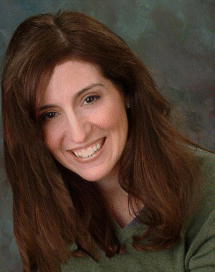


 RSS
RSS Twitter
Twitter GoodReads
GoodReads